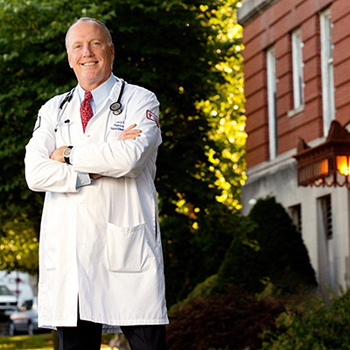
As I sit writing this contribution to the website, I have recently completed a two-week stint as a ward attending on the Medical Service at Rhode Island Hospital, which followed shortly after a two-week rotation at the Miriam Hospital. As always after my time on clinical service, I am energized by the experience. First and foremost, it was wonderful to be back seeing patients again. I remain humbled by how privileged I am to be able to care for patients during very difficult times in their lives. Few careers offer a person the opportunity to make someone’s day better with every workday. Sometimes we are fortunate enough to cure the patients, to make them completely better. More often, we address chronic diseases that require persistent management, where our interventions do not cure, but alleviate symptoms. Occasionally, we need to deliver bad news. Even those moments are an opportunity to do something good, by delivering the news as compassionately as we possibly can.
The Miriam and Rhode Island Hospitals are busy places, as are the Providence VA, Women and Infants Hospital and Kent County Hospital. Patients come in sick, get diagnosed very quickly and have therapeutic plans prepared for them, often over only a matter of hours. The successful execution of the complex choreography required for efficient use of hospital resources in modern times requires the dedicated work of physicians, nurses, nurses’ aides, pharmacists, administrators, social workers, dietary workers, transport workers, laboratory technicians and a host of other important role-players. I was very impressed by how quickly we were able to get things accomplished, and the good nature with which everyone did their jobs.
Of course, among the most pleasurable of my experiences was getting to know quite a few of our impressive medical house staff. Equally impressive, however, are the contributions made by our many subspecialty fellows throughout the institutions. These young subspecialists, just months into their training, already demonstrate a depth of knowledge which is applied on a daily basis to assist and guide the general medicine ward teams. The collaborative spirit for which Brown is known can be seen in their thoughtful guidance and discussions on rounds. Our geographically-localized ward teams are usually present when the specialty teams arrive for afternoon rounds. We often go to the bedside together to develop a plan, reassure a family or assess the success of a treatment. Doing this together makes the experience highly educational for the residents and fellows, as well as beneficial for our patients. As a Chairman of a large Department of Medicine, my disparate responsibilities often prevent more than limited and intermittent contact with trainees – at conferences, for example. The opportunity to serve as ward attending gives me a chance to get to see our residents and fellows interact on a very different level, to see them regularly make routine and major decisions – together. I encourage those of you considering Brown for your fellowship training to review our website in detail. Take a look at each of the fellowship offerings so that you may appreciate the spirit of support, of academic focus and clinical scope of opportunity that each of our subspecialty divisions provide.
The past couple of years have seen significant changes in our local environment here at Brown Hospitals. Our academic leader, Dean Mukesh Jain, has pursued a highly ambitious academic agenda designed to bring us to the top tiers of academic medical centers. A large new research building is being built just across the street from the medical school (which is a short walk from Rhode Island Hospital) and is planned to house a range of cutting-edge research areas. Dr. Jain has effectively partnered with John Fernandez, the CEO of the health system, to create a new partnership between Brown and the health system, complete with a name change from Lifespan to Brown University Health. The health system leadership is working on ambitious plans to upgrade our health care infrastructure to better suit the needs of patients in this state. We are also working to consolidate our physician practices in a manner that will allow better and more efficient care for our patients. Despite the many challenges of the current health care landscape. I am confident that the leaders of Brown University and Brown University Health are up to the challenge of insuring that our environment is optimized for providing state-of-the-art health care, performing world class research and training the next generation of providers long into the future.
One thing I truly miss about the pre-pandemic years is the opportunity to meet our residency applicants in person. I enjoyed the back and forth of the introductory time I spent with applicants all in the same room. While doing the intro on Zoom loses something compared to in person, the financial burden placed on applicants to travel to multiple residency sites cannot be justified, in my view. We will make every effort to ensure that you are able to get a strong sense of the truly rich environment we cherish here at the Brown Department of Medicine. We welcome you warmly. Thank you for your interest in Brown Internal Medicine.
Louis B. Rice, MD
Joukowsky Family Professor of Medicine
Professor of Molecular Microbiology and Immunology
Chairman, Department of Medicine
